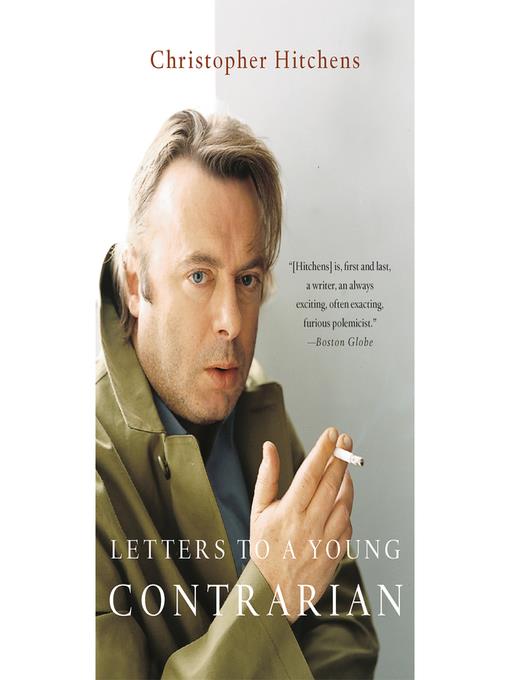
Letters to a Young Contrarian
فرمت کتاب
audiobook
تاریخ انتشار
2020
Lexile Score
1230
Reading Level
9-12
نویسنده
James Adamsناشر
Hachette Audioشابک
9781549189036
کتاب های مرتبط
- اطلاعات
- نقد و بررسی
- دیدگاه کاربران
نقد و بررسی

September 17, 2001
Hitchens, a columnist for the Nation
and Vanity Fair,
and author, most recently, of The Trial of Henry Kissinger, has made a career of disagreement and dissent, of being the thorn in search of a side. "Only an open conflict of ideas and principles can produce any clarity," he observes. Hitchens's views, also part of the Art of Mentoring series (see Dershowitz, above), unfold in the form of an ongoing correspondence with an imaginary mentee whom he advises on modes of thought, argument and self-determination, on how to "live at an angle to the safety and mediocrity of consensus." The threats to free will are many, some predictable: establishment powers, the media, religious edicts, the manipulation of language, polls, labels, people with answers. Less obvious corrosives: the Dalai Lama, harmony, the New York Times
claim to publish "all the news that's fit to print" ("conceited" and "censorious"). Indeed, the supply of enemies to rail against seems endless. Over a short span, Hitchens sounds off on a variety of topics—irony, radicalism, anarchy, socialism, solitude, faith and humor, to name a few—propelling readers through both time and space, from the Bible to Bosnia. At times, the argumentative positions seem offered up for their own sake—which the author argues is justified—and may inadvertently raise the question of how far we can define ourselves by what we are not. But this mini-manifesto, despite the somewhat mountainous terrain, should provide readers interested in current events and anti-establishment philosophy with a clearer view into one of today's more restless and provocative minds. (Oct.)Forecast:Basic figures there are as many budding contrarians out there as there are budding lawyers. The house is launching the new Art of Mentoring series with a 75,000-copy first printing of both books. With good media coverage (both authors will tour), Dershowitz's name and Hitchens's prickly reputation, both books should do well.

October 1, 2001
Perhaps best known for his indictment of ex-President Clinton in No One Left To Lie To, Hitchens, a columnist for Vanity Fair and the Nation, is usually thought of as an irritable, irreverent, sarcastic, witty, and intelligent champion of the Left with a penchant for transcending the party line. In this sense, his latest offering is surprising, not so much because of the content his sympathies are still decidedly leftist, even though he is critical of the Left's past failures but in tone and style. Debuting a book series modeled upon Rilke's Letters to a Young Poet, he offers advice and encouragement to any young person who feels compelled to lead a life of nonconformity and dissent. Instead of offering trenchant political criticism, he contemplates the implications of not blindly joining the herd, methods of argument and persuasion, and the need for disagreement in intellectual development. He is occasionally dismissive of ideologies that differ from his own (mainly religious), and he is unabashedly partisan an emphasis on such leftist ideals as universal equality and respect for human rights pervades the text. But, overall, his advice is thankfully nonpartisan, and his passionate call to embrace dialectic thinking and contentious debate is convincing and, well, correct. For undergraduate and larger public libraries. Heath Madom, "Library Journal"
Copyright 2001 Library Journal, LLC Used with permission.

October 1, 2001
It's difficult to think of a political writer who fits the description "contrarian" better than Hitchens; his advice to aspirants, patterned after Rilke's " Letters to a Young Poet" (a popular source--see also Alan Dershowitz's version on p.267) is instructive. To his credit, Hitchens recognizes he has no "lock" on wisdom and that he "can appear insufferable and annoying " without intending to do so."" Microcosmographia Academica," and Joseph Heller's " Catch-22, "among others. Hitchens is anticonsensus, even antitheist, as his critical study of Mother Teresa made clear. He is, however, broadly educated and a graceful writer, which suggests that even readers who disagree with him on many subjects will enjoy this commentary on the demands of "oppositionism."(Reprinted with permission of Booklist, copyright 2001, American Library Association.)

























دیدگاه کاربران